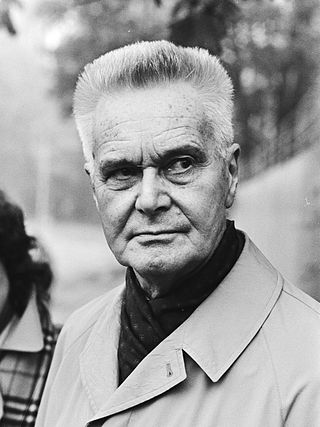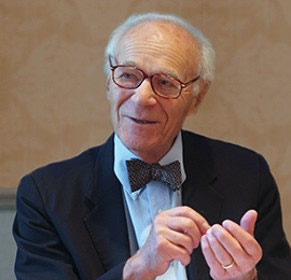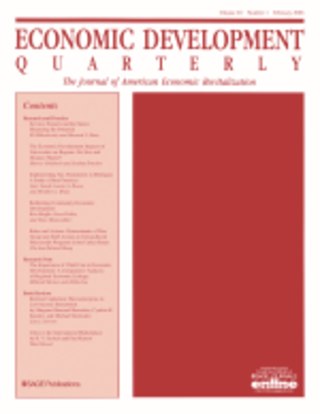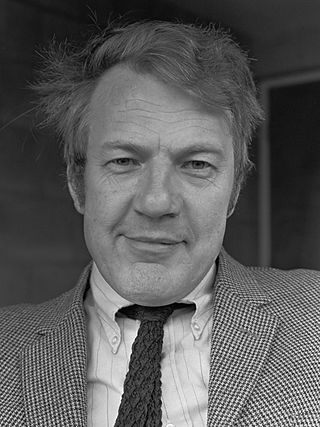
Econometrics is an application of statistical methods to economic data in order to give empirical content to economic relationships. More precisely, it is "the quantitative analysis of actual economic phenomena based on the concurrent development of theory and observation, related by appropriate methods of inference." An introductory economics textbook describes econometrics as allowing economists "to sift through mountains of data to extract simple relationships." Jan Tinbergen is one of the two founding fathers of econometrics. The other, Ragnar Frisch, also coined the term in the sense in which it is used today.

Ragnar Anton Kittil Frisch was an influential Norwegian economist known for being one of the major contributors to establishing economics as a quantitative and statistically informed science in the early 20th century. He coined the term econometrics in 1926 for utilising statistical methods to describe economic systems, as well as the terms microeconomics and macroeconomics in 1933, for describing individual and aggregate economic systems, respectively. He was the first to develop a statistically informed model of business cycles in 1933. Later work on the model, together with Jan Tinbergen, won the first Nobel Memorial Prize in Economic Sciences in 1969.

Jan Tinbergen was a Dutch economist who was awarded the first Nobel Memorial Prize in Economic Sciences in 1969, which he shared with Ragnar Frisch for having developed and applied dynamic models for the analysis of economic processes. He is widely considered to be one of the most influential economists of the 20th century and one of the founding fathers of econometrics.

Lawrence Robert Klein was an American economist. For his work in creating computer models to forecast economic trends in the field of econometrics in the Department of Economics at the University of Pennsylvania, he was awarded the Nobel Memorial Prize in Economic Sciences in 1980 specifically "for the creation of econometric models and their application to the analysis of economic fluctuations and economic policies." Due to his efforts, such models have become widespread among economists. Harvard University professor Martin Feldstein told the Wall Street Journal that Klein "was the first to create the statistical models that embodied Keynesian economics," tools still used by the Federal Reserve Bank and other central banks.
Econophysics is a non-orthodox interdisciplinary research field, applying theories and methods originally developed by physicists in order to solve problems in economics, usually those including uncertainty or stochastic processes and nonlinear dynamics. Some of its application to the study of financial markets has also been termed statistical finance referring to its roots in statistical physics. Econophysics is closely related to social physics.
The impact factor (IF) or journal impact factor (JIF) of an academic journal is a scientometric index calculated by Clarivate that reflects the yearly mean number of citations of articles published in the last two years in a given journal, as indexed by Clarivate's Web of Science.

The University of Bern is a public research university in the Swiss capital of Bern. It was founded in 1834. It is regulated and financed by the Canton of Bern. It is a comprehensive university offering a broad choice of courses and programs in eight faculties and some 150 institutes. With around 19,000 students, the University of Bern is the third largest university in Switzerland.

Erasmus University Rotterdam is a public research university located in Rotterdam, Netherlands. The university is named after Desiderius Erasmus Roterodamus, a 15th-century Christian humanist and theologian.
The h-index is an author-level metric that measures both the productivity and citation impact of the publications, initially used for an individual scientist or scholar. The h-index correlates with success indicators such as winning the Nobel Prize, being accepted for research fellowships and holding positions at top universities. The index is based on the set of the scientist's most cited papers and the number of citations that they have received in other publications. The index has more recently been applied to the productivity and impact of a scholarly journal as well as a group of scientists, such as a department or university or country. The index was suggested in 2005 by Jorge E. Hirsch, a physicist at UC San Diego, as a tool for determining theoretical physicists' relative quality and is sometimes called the Hirsch index or Hirsch number.
Pieter (Piet) Rietveld was a Dutch economist and Professor in Transport Economics at the Vrije Universiteit, Amsterdam, and a fellow at the Tinbergen Institute. He was among the top researchers in economic geography according to IDEAS/RePEc.
The Journal of Accounting Research (JAR) is a leading peer-reviewed academic journal associated with the University of Chicago. It was established in 1963 and is published by Wiley-Blackwell on behalf of the Chookaszian Accounting Research Center at the University of Chicago Booth School of Business.
Jan Brinkhuis is a Dutch mathematician, and Associate Professor of Finance and Mathematical Methods and Techniques at the Econometric Institute of Erasmus University Rotterdam, specialized in the theory and application of optimization theory and game theory.

Bikas Kanta Chakrabarti (born 14 December 1952 in Kolkata is an Indian physicist. At present he is INSA Scientist at the Saha Institute of Nuclear Physics & Visiting Professor at the Indian Statistical Institute, Kolkata, India.

Economic Development Quarterly is a peer-reviewed academic journal covering the field of economics. The journal's editors-in-chief are Larry C. Ledebur, Timothy J. Bartik, and George A. Erickcek. It was established in 1987 and is currently published by SAGE Publications in association with Cleveland State University.

StateUniversity of Trade and Economics is a Ukrainian university in the capital, Kyiv.
Econometric Institute at the Erasmus University Rotterdam is a leading research institute in the fields of econometrics and management science in the Netherlands. The Institute offers advanced education in econometrics. It was founded in 1956 by Henri Theil in cooperation with Jan Tinbergen.
Teunis (Teun) Kloek is a Dutch economist and Emeritus Professor of Econometrics at the Erasmus Universiteit Rotterdam. His research interests centered on econometric methods and their applications, especially nonparametric and robust methods in econometrics.
Herman Koene van Dijk is a Dutch economist Consultant at the Research Department of Norges Bank and Professor Emeritus at the Econometric Institute of the Erasmus University Rotterdam, known for his contributions in the field of Bayesian analysis.

Coenraad Nicolaas (Coen) Teulings is a Dutch economist and distinguished professor at Utrecht University. He was formerly professor of Economics at the University of Amsterdam and the University of Cambridge and former Director of the Bureau for Economic Policy Analysis, as well as Chairman of Merifin Capital.

Jan Salomon (Mars) Cramer was a Dutch economist, Professor of Statistics and Econometrics at the University of Amsterdam, known for his work of empirical econometrics.











